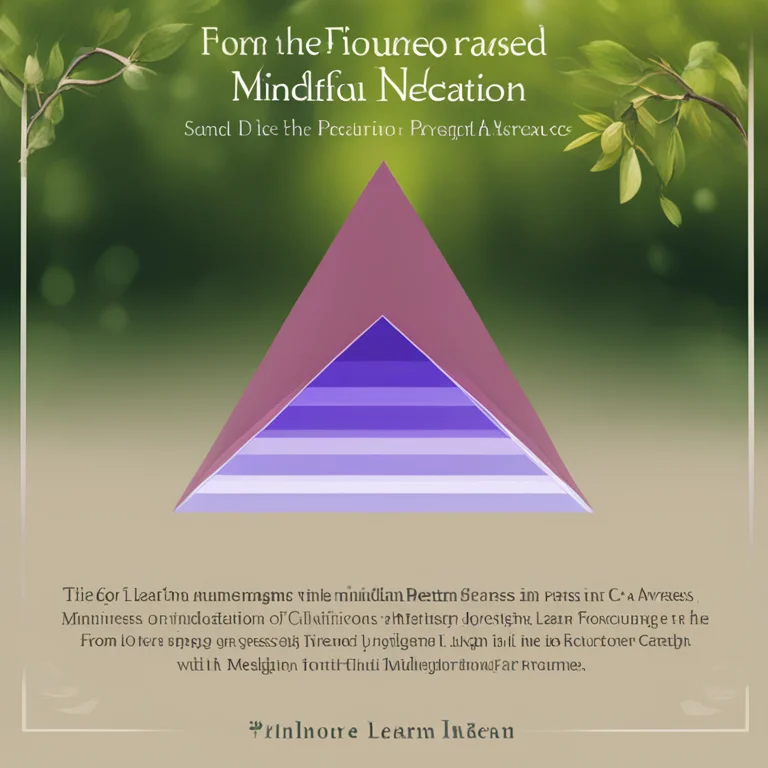
The Art of Stillness: Meditation and Mindfulness Practices
Delve into the serene world of meditation and mindfulness as we discuss techniques to cultivate inner peace and enhance well-being in this insightful article.
article by Hina Kurosawa
Embracing Serenity in a Frantic World
In a world perpetually in motion, finding a moment of tranquility has become a luxury. As we navigate through the complexities of modern life, it becomes essential to seek out practices that ground us. Meditation and mindfulness are time-honored traditions, now backed by science, that provide a refuge from chaos. These practices offer tools to slow down the relentless pace of thoughts and activities, inviting a sense of calm and presence. They are not mere esoteric concepts but accessible paths to enhanced mental clarity and emotional balance.

Foundations of Mindful Meditation
Mindful meditation is the cornerstone of cultivating awareness in the present moment. By focusing on the breath, sensations, or even a simple mantra, practitioners learn to observe their thoughts without judgement. This form of meditation has seen a resurgence, with mindfulness-based stress reduction programs proving effective in managing anxiety, depression, and stress. The essence of this practice is learning to be an impartial witness to one's inner experiences, fostering resilience and compassion towards oneself and others.

Strategies for Daily Mindfulness
Integrating mindfulness into daily life can seem daunting, but several strategies can simplify the process. Start with short, focused sessions of meditation and gradually increase the duration as your comfort grows. Use everyday tasks as opportunities for mindfulness—whether you're washing dishes or taking a walk, pay close attention to the sensory details involved. Technologies like meditation apps have also become instrumental in guiding newcomers and seasoned practitioners alike, offering a plethora of resources to enhance the meditation experience.

The Benefits of a Consistent Practice
A consistent meditation practice has a profound impact on well-being. Recent research indicates that regular meditation can alter the brain's anatomy, strengthening areas associated with attention and sensory processing. Additionally, the enhanced mindfulness that follows counteracts the habit of rumination and worry. With a sustained meditation routine, many report better sleep, improved relationships, and a heightened sense of overall happiness, confirming its transformative potential.
Aligning Meditation with Astrological Insights
As our website intertwines the wisdom of the stars with well-being practices, it's interesting to consider how meditation aligns with astrological insights. For instance, planetary transits can be times of heightened emotions, and meditation can provide a stabilizing anchor. Tailoring meditation practices to an individual's astrological chart may offer personalized pathways to inner peace, exemplifying the synergy between ancient wisdom and contemporary self-care modalities.
Moving Beyond Myths and Misconceptions
Contrary to popular myths, meditation requires no special equipment, and there's no single 'correct' way to practice. It is not about suppressing thoughts but rather observing them with non-attachment. Likewise, mindfulness does not demand continuous bliss; it embraces all ranges of human emotion. The key is consistency and patience, as the benefits are cumulative. Understanding and demystifying these practices allow for a more inclusive approach, breaking down barriers to entry for various demographics.
Future Pathways in Mindfulness Research
As we look beyond 2024, the trajectory of meditation and mindfulness research suggests a continued integration with various domains, from education to corporate wellness. Technological advancements, such as virtual reality meditation environments, are on the horizon, offering novel ways to engage with these practices. Moreover, the potential for mindfulness to address societal challenges, like enhancing empathy and reducing bias, positions these disciplines not only as tools for personal development but also as catalysts for collective transformation.
Published: 1/9/2024
Modified: 1/9/2024
More predictions
Come back here soon to learn more about yourself and your future


The Brain's Transformation Through Meditation
Delve into the profound effects of meditation on brain structure and function, and how it influences cognitive abilities and emotional well-being.


Mindfulness Meditation for Young Students
Mindfulness meditation practices tailored for first graders to foster attention, calmness, and emotional regulation.


Mind Boost: Can Meditation Enhance Intelligence?
This article delves into whether meditation practices can contribute to increased intelligence, combining scientific insights and practical advice for mental enhancement.